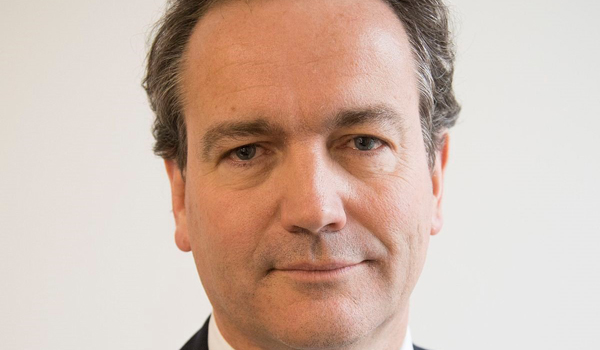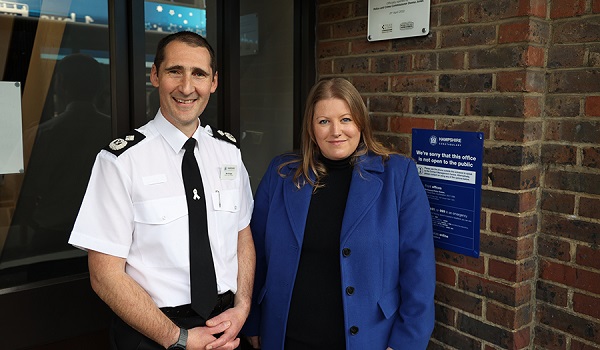Wellbeing and mental health made a priority under new package of measures to support police
The wellbeing and mental health of police officers and staff is to be made a priority under a series of recommendations following a year-long government consultation with those working on the front line.
The Home Office’s Front Line Review report, launched today (July 10) by Policing Minister Nick Hurd at the Police Federation of England and Wales’ (PFEW) headquarters in Leatherhead, makes a number of recommendations designed to improve the wellbeing of frontline officers, including:
- A commitment to look into shift patterns with a view to giving officers more time for wellbeing, as well as personal and professional development;
- The introduction of national inspections to assess how well forces promote staff wellbeing;
- Bringing police chiefs and their staff together to find solutions to the front line’s frustrations over internal bureaucracies, including administration and inefficiencies, to free-up time; and
- New guidance empowering police to push back against responding to inappropriate requests for attendance, often health or welfare-related, and where the police have neither the right skills nor powers to respond.
The new guidance is designed to make a difference for vulnerable people, giving them the right support from the right agencies, while also freeing-up time for the police to focus on tackling crime.
These measures are the result of 28 face-to-face workshops involving all 43 police forces across England and Wales in which frontline police staff and officers were able to provide candid views about demand, wellbeing challenges, insecurities around personal safety, training and morale.
The main concerns highlighted by officers included:
- A feeling that demand is increasing while capacity is decreasing;
- A general feeling that front line officers and staff feel undervalued by the wider policing system;
- A feeling of disconnect between the front line and senior / national decision makers; and
- Scepticism about the authenticity of the emerging wellbeing agenda and a desire to see it embedded in a consistent way with a lasting impact.
Exhaustion as a result of shift work was a common concern. While the six on/four off shift pattern was liked, the seven on/two off on a three-week rotating shift pattern was found to have a negative impact on levels of energy and mental health.
Many police community support officers said they had delayed applying to become officers because they did not want to work such anti-social hours.
Another common complaint that emerged during the workshops was that rest days are frequently cancelled. Interviewees said this then impacts on the following rest day and leave people unable to catch up on rest and feeling as though they are never away from work.
Officers also commented on the fact that they are regularly faced with inadequate or faulty equipment. A lack of common spaces where officers can mix together between shifts has resulted in the “unintended segregation of teams or roles” which then has a negative effect on mental health.
The researchers heard that repeated promises to cut bureaucracy and enable officers to spend less time on paperwork had come to nothing. If anything, the situation was said to have declined with information often having to be recorded multiple times.
An example was that when recording a fraud crime an ‘Action Fraud referral’, with exactly same information, would also need to be separately completed.
A major issue was the increasing perception of the police as a service that will not refuse to provide assistance, leading to spikes in demand from 4pm on Friday to 9am on Monday morning when other services – especially those associated with mental health – are closed.
Officers raised further concerns about the fact that mental health establishments are able to refuse to take patients from the police, that many mental health services fail to provide information when requested and that some agencies withhold information about safeguarding issues until the very last moment, despite having known about them for some time. Such issues were seen to place additional strain on resources and the wellbeing of the officers involved.
Following the workshops, the Government consulted with the College of Policing, the National Police Chiefs Council (NPCC), the PFEW, Her Majesty’s Inspectorate of Constabulary and Fire and Rescue Services, the Association of Police and Crime Commissioners and others to find ways to address the issues highlighted in the findings.
Home Secretary Sajid Javid, who announced the launch of the review at last year’s PFEW National Conference, said: “Our world-leading police keep us safe in the most challenging of circumstances, so it’s vital we do everything possible to support them in their roles.
“Over the past year we’ve been speaking to officers and listening to their views around how they can make the service they provide even better. As a result, we are taking action to reduce their workloads, ensure their wellbeing and give the front line a stronger voice in decision making.”
The Policing Minister intends to visit forces in Surrey, Wales and Essex to engage with officers directly on the new package of support.
“We wanted to hear directly from the front line of policing and the messages were clear. The need for more people. The call to stop wasting police time. The desire for more of a say in the decisions that affect the front line. The need for more time and support for both training and wellbeing,” said Mr Hurd.
“We have listened and now we are taking action with our partners to make sure police officers, staff and volunteers have the support they need, wherever they serve. This is on top of the increased investment to recruit more officers.”
PFEW Chair John Apter said: “In my 27 years’ service this is the first time I can recall the Home Office directly engaging with the front line to seek their views and I welcome that.
“I admit to being sceptical at first, concerned the Review would sidestep the important issues of pay, morale and trying to do more with fewer officers, but I was reassured to hear the Policing Minister acknowledge these views have been captured and will be considered alongside this.
“It is now important that we all work together to ensure these recommendations to prioritise the mental health and wellbeing become a meaningful reality for police officers.”
Deputy Chief Constable Bernie O’Reilly, executive director of the College of Policing, said the review “once again highlights the incredible professionalism and dedication of police officers and staff in England and Wales”.
He added: “The review makes the concerns of those on the front line clear and endorses much of our ongoing work. It is vital we continue to work with everyone across policing to address those needs.
“Policing is under strain, sickness absence rates are up, and more investment is needed to support the wellbeing of officers and staff. We have taken the first steps to deliver additional tangible support to frontline officers and staff through the launch of the National Police Wellbeing Service, but we cannot stop there. Forces must be supported to invest more in those who work for them.
“This support must include help to manage the changing demands officers and staff face. The front line should be recognised, developed and trained for the difficult job they do every day.
“We will consider the findings of the review carefully to ensure we identify all of the areas where the college can help. A full response will be published in due course, but in the meantime, we will continue to work with partners across the service to support officers and staff.”
NPCC Chair Martin Hewitt said the review provides an important insight into how frontline officers and staff are feeling.
He said: “We will listen and act on the findings. We are already taking action to address many of the issues raised. Significant investment is going into improving IT and the National Police Wellbeing Service was launched earlier this year, which will provide the right support for the daily strains and stresses of policing as well as traumatic events.
“Those on the front line are often best equipped to innovate and find solutions to difficult problems and there are some great examples of this from around the country. We look forward to working with others to enable that to happen consistently at a national level. We will look carefully at how we can eliminate the sources of internal bureaucracy to free up time and reduce stress.
“We have been clear that policing is under intense strain, which is felt acutely by those on the front line with a deeply concerning impact on their wellbeing. We are working with the Home Office to make the case for increased funding at the next government spending review to ease pressure and reduce crime.”
Mark Burns-Williamson, West Yorkshire’s Police and Crime Commissioner (PCC) and Chair of the Association of Police and Crime Commissioner’s (APCC) said: “We welcome the review’s initial proposals to ensure that officer and staff wellbeing is at the heart of policing through inclusion and embedding it in the inspection framework.
“We also welcome the commitment to enable police officers and staff to focus on their core roles rather than having to increasingly respond to inappropriate demands best met elsewhere. We also recognise and know that the police system is currently under intense strain and that further sustained resources are needed if we are to deliver against the proposals within the review.
“PCCs will continue to work closely with colleagues from the Federation, staff associations, Home office, NPCC and more widely to secure the best possible outcome for policing from the forthcoming spending review.
“Policing is the ‘last line’ of defence and officers and staff can be faced with significant and traumatic situations on a daily basis. It is crucial that their wellbeing is protected so they can continue to lead fulfilling lives.”







